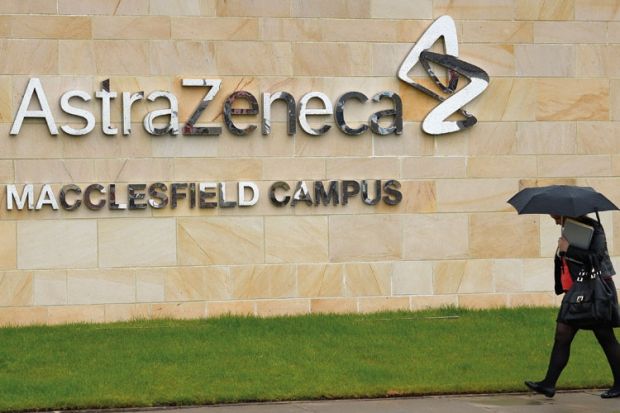Source: Getty
Acquisition fears: one academic warned that a takeover would do ‘serious damage’ if Pfizer treated AstraZeneca in the way it has past buyouts, where R&D activity has been cut
US pharmaceutical company Pfizer’s recent proposed takeover of AstraZeneca climbed to the top of the political agenda, culminating in its dominating Prime Minister’s Questions in the House of Commons. Before a “final bid” was rejected this week, politicians wrangled over whether the bid was a threat to the national interest and whether anything could be done to block it. But less was said about what the merger would mean for universities.
The pharmaceutical industry plays a huge part in the UK’s life sciences ecosystem. University departments up and down the country work on a daily basis with companies such as AstraZeneca that collaborate with academics on projects, bring drugs developed in university laboratories to market and serve as partners in public-private innovation centres.
Michael Hopkins, director of research at the University of Sussex’s interdisciplinary centre Science and Technology Policy Research, said that industry spent far more on research and development in science than government, with the vast majority in the UK coming from AstraZeneca and GlaxoSmithKline.
If Pfizer ever took over AstraZeneca and treated it in the same way as it has previous acquisitions, where the amount of R&D activity has been cut, the takeover would “do serious damage” he said.
One of the areas that would be hit hard is cancer research, according to Dr Hopkins. A recent study of his suggests that Pfizer and AstraZeneca publish the most papers in this area nationwide. “That is a strong area of research and you would be losing capacity,” he said.
Dr Hopkins said that he “would not want” to speculate about the implications for the big charities that fund such research, such as Cancer Research UK and the Wellcome Trust. But the overall health of a country’s science base plays an important role in such charities’ decisions about where to have research carried out.
In a letter to chancellor George Osborne earlier this month, the Wellcome Trust pointed out that the pharmaceutical industry had a “critical influence on academic science”. It flagged cancer as one of six biomedical areas in which the UK has “world class strength”, and warned of the potential for Pfizer to move any merged oncology activities to the West Coast of the US.
“For the life sciences ecosystem to thrive, it is important that these strengths are closely aligned with the R&D interests of the pharmaceutical industry in the UK,” the letter warned.
‘Global leadership’ strategy at risk
The pharmaceutical industry is also a cornerstone of the government’s Strategy for UK Life Sciences, which was launched in 2011 with the aim of re-establishing the UK’s global leadership in the field.
Dr Hopkins said that AstraZeneca has been a participant in life sciences initiatives supported by the Technology Strategy Board, and that a takeover of the firm by another could lead to a “reduced volume of activity” in this area.
Tim Brundle, director of innovation at the University of Ulster, noted that the “default position” for the majority of universities with innovative work in the life sciences is to license the resultant intellectual property to multinational companies.
“It is very difficult in the UK to take the next step yourself,” he said. Hurdles for academics wanting to go it alone include the challenge of securing start-up capital for life sciences initiatives and the typically long route to market for pharmaceuticals, he added.

Mr Brundle said that the effect on commercialisation of any takeover of AstraZeneca would be “minor”, as the marketplace for intellectual property would still exist internationally. Nevertheless, having such companies on the university’s doorstep was advantageous, not least because academia and industry are in the same legal environment if they are working within one country. Government funding streams are also available to help develop these partnerships, said Mr Brundle.
Swedish disappointments recalled
Of course, the UK is not the only country that stands to lose out in a takeover of the Anglo-Swedish AstraZeneca. Sweden still remembers the effect on its life sciences sector when the US firm Upjohn merged in 1995 with Swedish company Pharmacia, with Pfizer later going on to acquire the majority of the merged firm.
Staffan Edén, assistant vice-chancellor at the University of Gothenburg, said that most of Pharmacia’s research activities eventually disappeared from Sweden as a result of the merger. He added that he could see the same thing happening in the UK in the event of an AstraZeneca-Pfizer deal.
Professor Edén said that before the Upjohn-Pharmacia merger, Sweden had two multinational pharmaceutical players, which was “good for the life sciences environment”. He added: “After the [Pharmacia] takeover we were left with just Astra and perhaps it was not good to have only one main actor in the market.”
If Pfizer did eventually wind up much of AstraZeneca’s activities following a takeover, the UK could be left in a similar predicament, as only GlaxoSmithKline would remain. Professor Edén said he would expect “major changes in the UK” if the merger went ahead. He added that there could also be a shift in the pharmaceutical industry; in Sweden, many of Pharmacia’s researchers ended up in small drug development start-ups in the Stockholm area.
But Sussex’s Dr Hopkins warned against placing bets on the UK’s start-up scene mopping up the science fall-out from any takeover. He contended that Sweden lost scientists forever as a result of the Pharmacia-Upjohn merger.
“They didn’t end up with lots of exciting companies springing out of that, and it is extremely dangerous to assume that it would happen in the UK, given the fact that the private sector investment in biotechnology has generally been quite poor for most of the last decade,” he added.
In the event of mass job losses in the UK, Dr Hopkins said: “It is not clear if there are the companies or universities able to take up those people…There just is not anywhere for them to go.”
He argued that scientists in the big companies have the best skills to benefit the science base; they are “extremely well trained” and “understand how the science should be done”.
Mr Brundle said that “entrepreneurship and indigenous companies” and collaborations with universities would have a role to play in the event of a takeover of AstraZeneca, but the UK government also needed to consider what it could do to help.
“There are many lessons that we should be learning about the kind of policy levers that the government can bring into play to encourage further engagement in the commercialisation of the life sciences,” he said.
But perhaps most importantly, he added, the UK would need to focus its effort on determining where the next AstraZeneca will come from.
Register to continue
Why register?
- Registration is free and only takes a moment
- Once registered, you can read 3 articles a month
- Sign up for our newsletter
Subscribe
Or subscribe for unlimited access to:
- Unlimited access to news, views, insights & reviews
- Digital editions
- Digital access to THE’s university and college rankings analysis
Already registered or a current subscriber?





